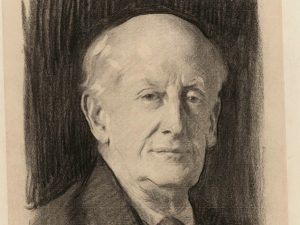Geoffrey Austrian in Harvard Magazine:
 ON JUNE 15, 1898, when Moorfield Storey, A.B. 1866, stood up to speak in Boston’s historic Faneuil Hall, the United States had just invaded the Philippines, promising the inhabitants their freedom—only to quickly renege on its word. Storey was incensed. “A war begun to win the Cubans the right to govern themselves,” he proclaimed, “should not be made an excuse for extending our sway over other alien peoples.” His speech sparked a movement that raced across the country, and he became the first president of the newly formed Anti-Imperialist League. Born into a long-settled family, comfortable but not wealthy, Storey gained the sense of security he needed to chart an independent course. He inherited from his abolitionist mother, Elizabeth Moorfield, a tenacious adherence to the high principles that characterized his life.
ON JUNE 15, 1898, when Moorfield Storey, A.B. 1866, stood up to speak in Boston’s historic Faneuil Hall, the United States had just invaded the Philippines, promising the inhabitants their freedom—only to quickly renege on its word. Storey was incensed. “A war begun to win the Cubans the right to govern themselves,” he proclaimed, “should not be made an excuse for extending our sway over other alien peoples.” His speech sparked a movement that raced across the country, and he became the first president of the newly formed Anti-Imperialist League. Born into a long-settled family, comfortable but not wealthy, Storey gained the sense of security he needed to chart an independent course. He inherited from his abolitionist mother, Elizabeth Moorfield, a tenacious adherence to the high principles that characterized his life.
…He was one of the prominent, mostly white, Americans who gathered, six months after a bloody race riot in Lincoln’s hometown of Springfield, Illinois, and founded the NAACP in February 1909; in 1910 he was named its president, a post he held until his death. As a former American Bar Association (ABA) president and noted constitutional lawyer, he contributed prestige and hard work to the new group as its legal counsel. In 1913, the NAACP filed its first brief, in Guinn v. United States, a case before the U.S. Supreme Court challenging the legitimacy of the so-called grandfather clause—a statutory provision in some Southern states that disenfranchised black voters by specifying that men whose grandfathers were not voters before the Civil War could not themselves vote. The court ruled in 1915 that such a clause was unconstitutional.
More here.
